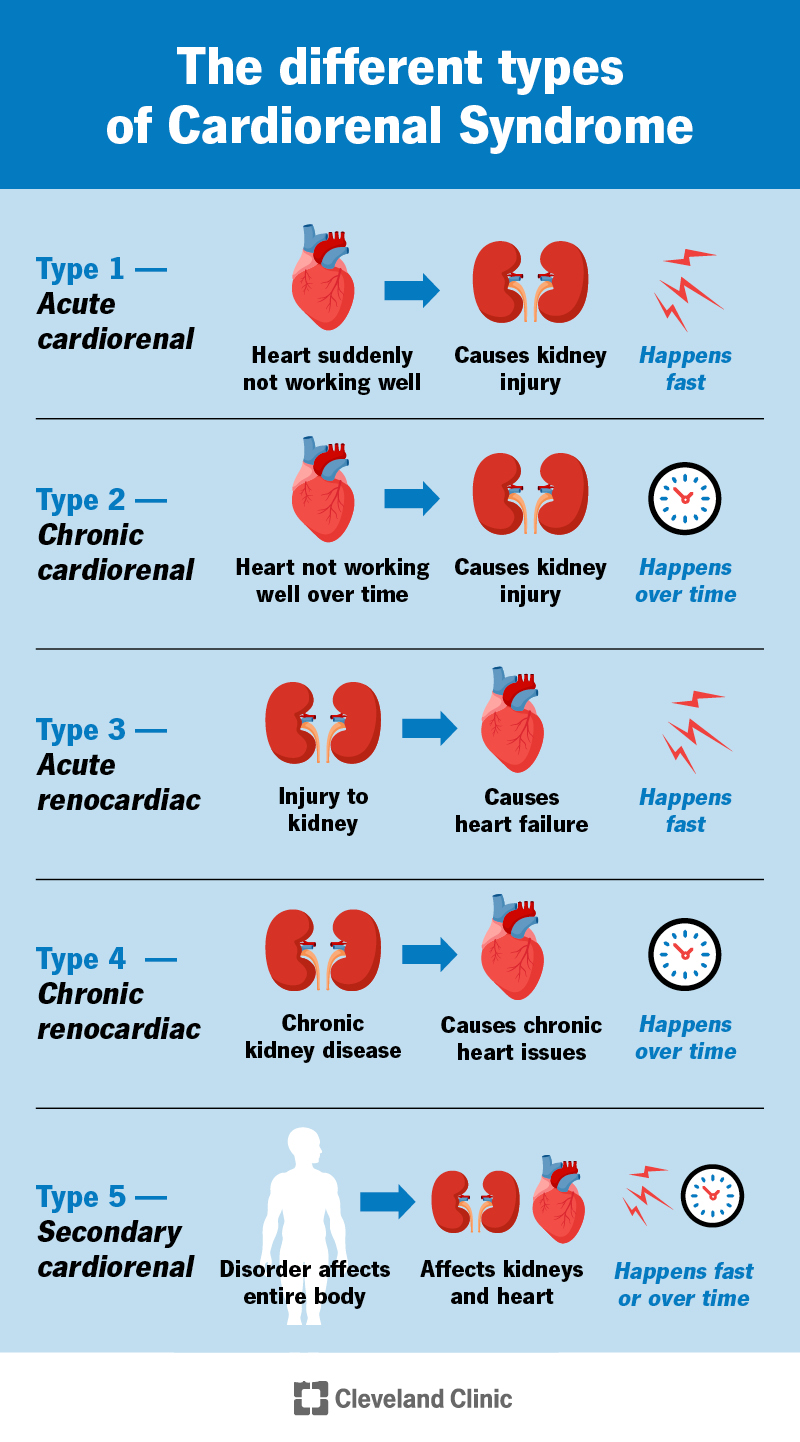Cardiorenal syndrome is a disorder that involves an issue in your heart that harms your kidneys or the other way around. This can happen suddenly or over a longer time period. Many medical problems can trigger a complex chain of events leading to trouble with how well your heart and kidneys work.
Advertisement
Cleveland Clinic is a non-profit academic medical center. Advertising on our site helps support our mission. We do not endorse non-Cleveland Clinic products or services. Policy

Image content: This image is available to view online.
View image online (https://my.clevelandclinic.org/-/scassets/images/org/health/articles/25240-cardiorenal-syndrome-update-cv)
Cardiorenal syndrome is a disorder of your heart and kidneys where an issue with one organ causes a problem in the other. These problems can be acute (happening now) or chronic (long-term).
Advertisement
Cleveland Clinic is a non-profit academic medical center. Advertising on our site helps support our mission. We do not endorse non-Cleveland Clinic products or services. Policy
Your kidneys and heart both handle your blood. Your heart keeps blood moving through your body, and your kidneys clean waste from your blood. But your kidneys also control how much salt and water leave your body through pee. This affects your blood pressure and how much fluid your body holds onto.
Cardiorenal syndrome involves a complex process with many different factors affecting your kidneys and heart. Some factors involved may include:
It’s very common for people to have issues with their hearts and kidneys at the same time. About 64 million people in the world have heart failure. Healthcare providers have seen kidney disease in up to 6 out of 10 people with chronic heart failure. Sometimes, it’s difficult for providers to know which organ had issues first. It’s best to seek treatment early, as this syndrome doesn’t have a good prognosis (outlook).
Cardiorenal syndrome symptoms may differ depending on the organ it started in and when. They include:
Advertisement
Causes of cardiorenal syndrome may include:
When healthcare providers talk about this condition, they assign it a type based on the organ that started it and how long ago it began.
Cardiorenal syndrome types are:
Cardiorenal syndrome risk factors include:
You may be able to lower your risk of cardiorenal disease by treating these conditions. Taking the right medications for these conditions at the right dose is important. Otherwise, they can make your kidney function worse.
With cardiorenal syndrome, you don’t have a normal amount of blood and fluids in your body. When you have heart failure, your heart can’t pump as well as it should. This allows fluid to collect in parts of your body. Your kidneys play a role in moving fluid out of your body to maintain the right fluid level. It can be challenging to achieve this when you have issues with your heart and kidneys at the same time.
Cardiorenal disease can lead to:
Cardiorenal syndrome doesn’t have one “gold standard” test a healthcare provider can use to diagnose it. A provider may get information by examining the amount of fluid in your body. They do this by assessing your heart, lungs, belly, legs and blood vessels. Also, they may order various tests.
Healthcare providers can diagnose cardiorenal syndrome with:
Advertisement
Cardiorenal syndrome treatments range from medicines to devices to transplants.
Medicines for this condition include:
Procedures and devices for cardiorenal syndrome include:
Tell your provider about any symptoms you have that are new or get worse. Keep your scheduled appointments with your provider. Get immediate help if you’re not producing pee or you can’t catch your breath.
Questions to ask your provider include:
Getting an early diagnosis for cardiorenal syndrome is important. Having the right treatment when you need it can improve your quality of life.
The prognosis for cardiorenal syndrome is poor. Your risk of death is higher with this condition than if you only had a kidney issue or a heart issue. Palliative care can help you if you have advanced cardiorenal syndrome. It can help you avoid trips to the hospital.
Advertisement
Having cardiorenal syndrome is difficult because it means that three important organs — your heart and two kidneys — aren’t working right. Follow your provider’s instructions as closely as you can for the best results. Informing your loved ones about your wishes can give you peace of mind. If your condition worsens quickly and you have a living will, it can guide your family in deciding what care you want.
Advertisement

Sign up for our Health Essentials emails for expert guidance on nutrition, fitness, sleep, skin care and more.
Learn more about the Health Library and our editorial process.
Cleveland Clinic’s health articles are based on evidence-backed information and review by medical professionals to ensure accuracy, reliability and up-to-date clinical standards.
Cleveland Clinic’s health articles are based on evidence-backed information and review by medical professionals to ensure accuracy, reliability and up-to-date clinical standards.